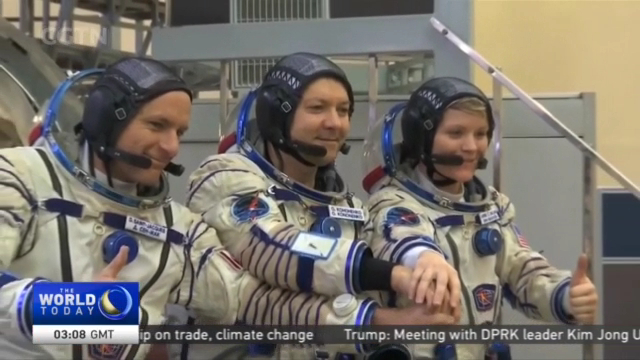
12:12, 03-Dec-2018
Russian Space Launch: Manned rocket to be sent after failed October launch
Updated
11:30, 06-Dec-2018
02:37

A manned Russian rocket will be sent into space on Monday, the first since activity was suspended after a rocket failure in October, which saw astronauts abort their mission and make an emergency landing. This latest launch, involving three astronauts, comes as the pressure is on for Russia's space agency, which has been beset by a series of problems this year. Julia Chapman reports from Moscow.
When you're about to be launched into space, training is everything. That's even more true after something goes wrong. These astronauts are gearing up to travel to the International Space Station.
They're the first do so since two of their colleagues were forced to carry out an emergency landing following a rocket failure over a month ago.
But the American and Canadian astronauts and their Russian cosmonaut colleague are confident that they're ready for lift-off.
ANNE McCLAIN US ASTRONAUT "A lot of people called it an accident, or an incident, or maybe want to use it as an example of it not being safe. But for us, it's exactly the opposite, because our friends came home. The systems worked. They worked exactly as they were designed and we are ready to fly. We trust that system."
In October, a Soyuz-FG rocket failed two minutes after take-off. Investigators say a sensor malfunctioned after it was damaged during assembly. Russian-made Soyuz rockets are the only current system for sending humans into space.
The incident has turned the spotlight on Russian space agency Roscosmos. And just a few days ago, Russian prosecutors brought accusations of systemic legal violations against the state-run organisation.
Some critics say Roscosmos is no longer fit for purpose.
Natan Eismont, a senior member of the Russian Space Research Institute, says Roscosmos has been plagued with funding problems for years. But he rejects suggestions that privatisation is the future for Russia's space industry.
NATHAN EISMONT SPACE EXPERT "Everyone says that private is better. Maybe in some places, it's better, but in others, it's not. In any case, an abrupt transfer from one method of governance to another is fraught with difficulties. So if such a transition is to be undertaken, it has to be done very slowly. Is Russia ready for such a transfer into private hands? In my opinion, no."
JULIA CHAPMAN MOSCOW "Russia's space programme is a source of immense national pride and a rare point of cooperation with America. Any issues that arise, put that relationship at risk. And with one of the world's most advanced space industries, Russia knows the stakes are very high indeed. Julia Chapman, CGTN, Moscow."

SITEMAP
Copyright © 2018 CGTN. Beijing ICP prepared NO.16065310-3
Copyright © 2018 CGTN. Beijing ICP prepared NO.16065310-3